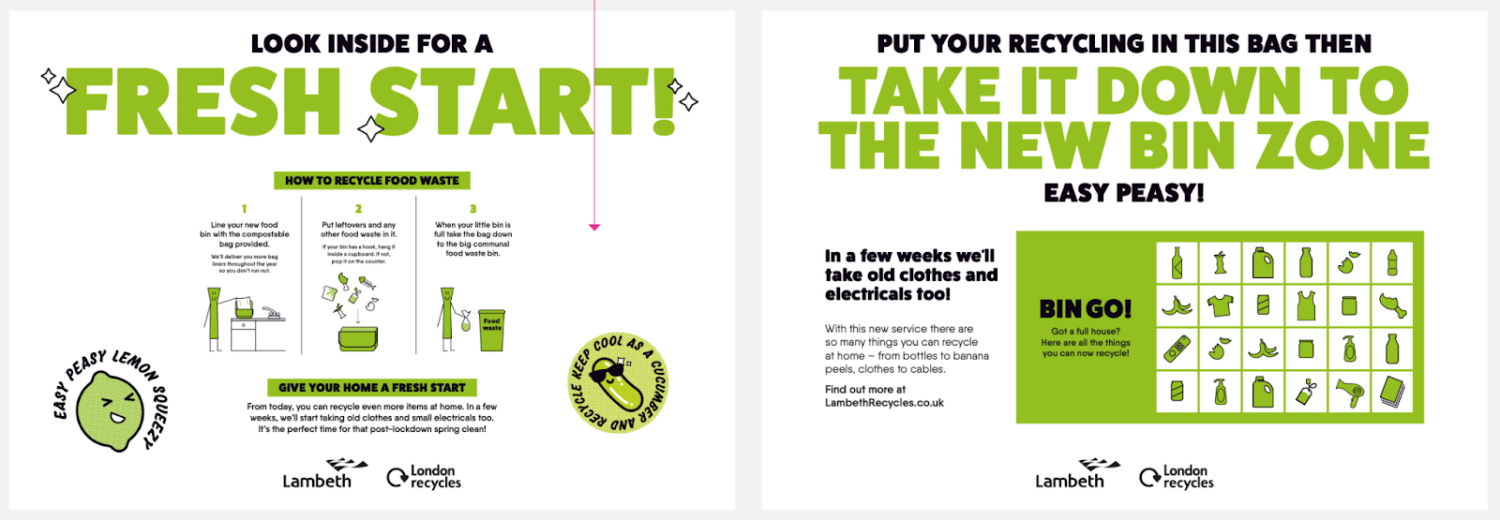Background
Purpose-built flats have historically suffered with low recycling rates due to a range of contextual factors influencing the recycling behaviour of residents, including lack of space for in-home recycling storage, weaker social norms, no ownership of communal spaces and a lack of accountability for what is put in communal bins.
We worked with ReLondon to completely refresh the recycling service in purpose-built flats in 4 different estates in Lambeth. By incorporating behavioural insight throughout, the “fresh new start” resulted in an impressive 150% uplift in recycling.
Insight
Purpose-built flats make up a large proportion of residences in Lambeth, so poor recycling rates have a big impact on their recycling targets. Therefore, ReLondon tasked us with using behavioural science to help them to rethink the recycling service in purpose-built flats in Lambeth, focusing on 4 different estates. Their specific objectives were to:
- Increase the capture and quality of dry mixed recycling (e.g. cardboard, plastics, glass and cans)
- Introduce and drive take up of new food waste, textiles and WEEE (i.e. small electrical appliances) collections
Reviewing the evidence led us to four key categories of determinants of recycling behaviour in flats across DMR, food waste, textiles and WEEE:
- Infrastructure: Is the recycling system usable for residents? Do they have the space available to them to recycle correctly?
- Knowledge: Do residents know how to use the recycling service available? Do they know what they can and can’t recycle?
- Motivation: Do residents feel like they should make the effort to recycle and recycle properly?
- Ease: Is recycling just as easy, or easier than throwing everything in the general waste?
To influence recycling behaviour, our intervention needed to acknowledge and tackle all four of these areas.

Intervention
Moments of change present a great opportunity to change behaviour, as usual habits are disrupted, opening up the chance to form new ones. Our intervention therefore focused on making the introduction of the new recycling services for food waste, WEEE and textiles a bold and exciting moment of change - creating a “fresh new start” for residents. The intervention made the existing waste and recycling service easier and more pleasant to use, and ensured we solved recognisable problems that residents had been experiencing in the process. All elements of the intervention targeted the challenges we discovered in our insight phase - spanning ease, knowledge, motivation and infrastructure.
Implementation
We worked with our friends at Among Equals to develop bold, prominent and highly visible comms that really encapsulated the fresh feel we were going for. The “fresh new start” - among many things - saw existing bins get a makeover, making them more appealing and motivating to use; bold and prominent signage in and around the bins, making it easy for residents to know what goes where; and innovative ways to engage residents with postal comms about their new service - including the provision of a teabag so that they could enjoy a cup of tea whilst reading about the new food waste service (and of course instructions on how to recycle the teabag after!).
To make sure that we made the most of every possible opportunity to engage with residents, we also trialled new ways to communicate with them in the moment that they received their caddy. Instead of just leaving food waste caddies on doorsteps (which is what commonly happens), we delivered the caddies in paper bags, allowing for an innovative and targeted way to deliver instructions and advice. The paper bag also solved another common problem residents of purpose-built flats face - acting as a (recyclable) way to transport their recycling to the communal bins. In many cases the caddies were also delivered face-to-face, which allowed for a personalised approach and the opportunity to have a conversation about the new service.

As well as the initial communication with residents, we created a calendar of comms touchpoints to ensure that the new service was unmissable for residents and that they stayed engaged beyond the initial launch.
Impact
Waste composition analysis was used to measure effectiveness, pre and post the intervention. The “fresh new start” saw an impressive 150% increase in recycling across all types - and an associated 31% decrease in residual waste generated. For each type of recycling:
- Dry recycling capture rates increased by 44%
- Amount of food within residual waste decreased by 45%
- Amount of textiles in residual waste decreased by 26%
- Amount of target WEEE in residual waste decreased by 52%
To learn more about this work, read ReLondon’s report on the project.
We continue to use our learnings from this project in our other recycling projects. Get in touch if you have a recycling challenge you need help tackling!
